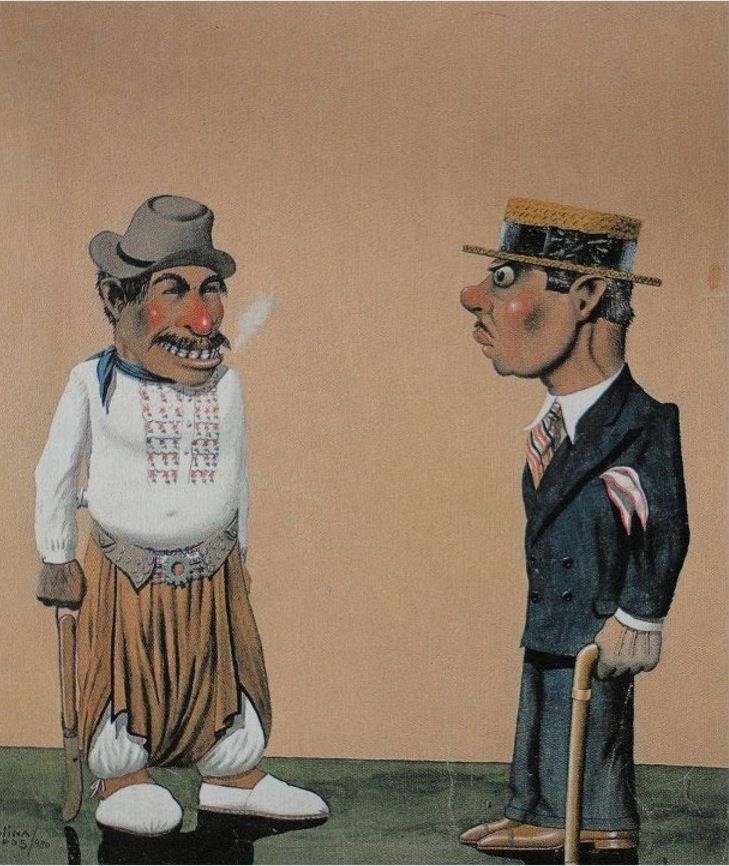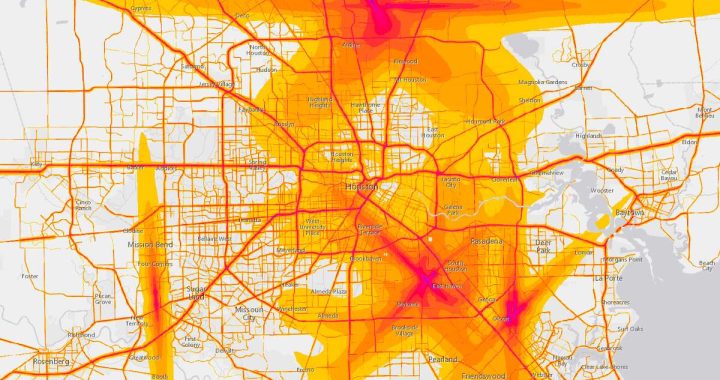(Art by Florencio Molina Campos)
In response to The New York Times article “650 Prompts for Narrative and Personal Writing.”
217. “Have You Ever Tried to Hide Your Racial or Ethnic Identity?”
Yes, embarrassingly enough. And my subterfuge tied itself to language, I must confess.
Around middle school I started telling classmates that I had been born in Argentina. Probably the very opposite of what the NYT question intended, which at first I read as, “Have you ever lied to fit in with Americans?” I used to hide my Houston birth so as to not fit in. I wanted to separate myself from the school world at odds with my family life. The fact that my parents had been born somewhere else and I in the country they just happen to find themselves in during the year of my birth seemed extremely arbitrary, even to me, an 11 year old. So I lied about the one point that made me “ni de aquí, ni de allá.” Otherwise I 100% grew up sky blue and white, on Elena Walsh, mojellas y costillas, and trips south of the border.
The classmates who knew me already figured I wasn’t Texan after I had told them I didn’t like the rodeo, so it was an easy lie to keep. I spoke Spanish well enough for the anglos, and differently enough from the hispanos, for everyone to believe me. It was my tongue, and not my skin, that made me different. Five years I hid my ethnic background (of Texan, I guess), because, really, I didn’t grow up Texan to begin with. Sure, I would sing the pledge of allegiance every morning, like a good schoolboy, but when it came to explaining why my family opened presents on the 24th, or took so many trips, or why I mispronounced words, or why I was so quiet in class, it was easier to say I wasn’t from around here.
In 2005 I visited the country I had told everyone I was from after not having been there in ten years. For two months my brother and I rotated between my grandmother’s apartment in the capital, my uncles’ in the north of the city, and in the south with my aunts. Without detailing the travelogue, I’ll say 2005 was the trip that convinced me I should have been born there. I remember my cousins, my brother and I all squeezed in a tiny elevator on the way to a video game arcade, and looking at ourselves in the mirror, and agreeing that to not get bullied or robbed on the street–like our parents had warned us could happen–we should pretend we were actually from Argentina. “No vayan diciendo que son gringos,” they had ordered. We were more than happy. The lie had migrated south. From behind my mask, I absorbed as many of the mannerisms as I could, taking the “che,” “viste,” y “boludo” interjections and transforming them into vocal ticks. It was the first and only time I heard my grandmother, over tea with her friends down the hall, say: “Iván quiere ser más argentino que los argentinos.” I turned 14 in la Patagonia, and grew two inches in one month.
That August I began high school. With my new boli-market, trucho, fake, outlet quality sports clothes and bracelets, I had the wardrobe to back up my Spanish. It became easier than ever to tell people I had been born far, far away. It never felt right to answer “Where are you from?” with a long drawn out script about this and that and where my parents had grown up and where I had grown up and no, no, really my dad wasn’t born in Buenos Aires but in a suburb north of the city, and no, no, my mother was actually born in New Delhi and then lived in the Soviet Union for half a decade and then the Philippians and then Canada and then finally Argentina where she met my dad and the two of them moved to Houston for grad school, and, yeah, I don’t know how babies are born but they had me there, and if I haven’t bored you yet with this sentence I’ve repeated hundreds and hundreds of times then I’ll add that half of my family in the States resents Argentina and the other half misses it terribly, and what the hell was a boy to do with all this information when all his friends could answer the getting-to-know-you questions directly and move on to more fun games? “I was born in Buenos Aires,” was much faster to say than running-on about my life and losing people’s attention. In retrospect, maybe I hated telling the story because I did want to fit in by having a simple one just like everyone else.
In 2007 I returned to the place I wanted so desperately to be my home. This time I felt older, and ready to absorb even more. The trip ran a similar course: part time at abuela’s, las casas de varios tios, and a bit of ski and a bit of big city roaming around on foot. Pan-fried stake for lunch, grilled sausages for dinner, and a half loaf of bread with butter and jam for breakfast every day: that summer I grew four inches. The country was literally inside of me, forming the fibers of my muscle and lining the ligaments of my very being. My blood was chimichurri. That trip, my aunt asked my cousin’s high school to let my brother and I to sit in on their classes. You think I was excited to take their winter classes during my summer vacation? Damn right I was, if it meant being an Argentine high-schooler for a day. To my surprise however, aside from the English and the Philosophy classes, I was just as shy in a high school de la provincia de Río Negro as I was in one north of the Rio Grande. That was the day I realized my Spanish hadn’t evolved passed my parents’ house, whereas all the teens my age had basically come up with their own language. The phrases I learned at home were out of sync with this new generation, people my age. Sad face. Around a couple of margherita pizzas, a family friend commented, “Iván sabe conjugar el condicional.” Though it was meant as a compliment, it hurt. I realized then I didn’t even know how I was using the language–meanwhile the kids around me had studied it in school, and knew what to call the “ía” words. I turned 16 on the coldest July of my life, alone for most of my birthday, to amble the boulevards of Puerto Madero with my hands in my jacket pockets.
When junior year started, I didn’t keep up with the lie any more. I knew I couldn’t. I straight up deflected any questions regarding where I was from. Yes, classmates were still asking me, as if making sure. But I treated them like I did my own confusing voice inside my head, ignoring the question all together. Everyone has their own high school sob stories. And one of mine hit the unfunny bone of my identity. Off a recommendation by a teacher I admired, I signed up to earn Spanish credits by exam. It would be an easy way to raise my GPA. I took four exams, one per semester of credit, back to back, all in one week. Only an A would earn me credit. But I figured, I got this, and didn’t study for a single one. I remember waltzing in to the administrative office to take a test, and strutting out with a dopey smile on my face, thinking damn I just earned the easiest A in my life. My first test grade came back a 90-something. The second an 80-something. The third, barely a C. And the last grade I would have rather not seen.
Again, in 2009 I went back, and hit the third and final growth spurt. This time, I figured I should come clean about my life, and that I might as well start by telling Argentines the truth. It’s easier to be honest abroad if you don’t think about it. So that winter in Argentina I would reply the “¿De dónde sos?” question with hesitation and nervios, but ultimately with a “De los Estados Unidos.” I always cringed right after, because such a scripted question usually preceded a scripted follow-up comment. “Hablás castellano bien por ser yanqui.” That year the word yanqui was in vogue and it didn’t bother me as much to be called one back then, at least not as much as having a native Argentine compliment the language that I had been raised on. It’s hard to describe the awkwardness that comes after a well-meaning compliment on my Spanish. For years, when I heard “Que bien que hablás castellano,” it meant, “You don’t speak like us.” And then, “¿Cómo?” they would ask. What am I supposed to say? That it’s the language my mother used to cradle me in her arms; that it’s the language my father used to teach me right from wrong. I had a hard time believing anyone cared, either because I would stutter my answers in Spanish, or they would ignore it and move on to some other topic, and I had naught the gall to speak up. My confidence in Spanish became a mumbled ruin of what it had once been. For years after, if I spoke in Spanish, it was with the tight lips of an Englishmen. I didn’t come back to the States with the emulated porteño accent that year, which 2009 onward came off as a whine to me anyway. “En serio? No, no seas guacha. Dale, porfa? Sori.”
2015:
“¿Para qué vas a Argentina?”
I looked at my dad and took a deep breath. “Para mejorar mi castellano,” I told him.
Two years ago, I took the first trip back to that country so far removed. My grandmother’s apartment became my home for 9 months, wherein the first couple I became completely absorbed in studies. I would wake up at 8 am, read books in Spanish with a pen in my hand until lunch, eat a thick stake, then fill out college applications, drink a mate out on the balcony, dance tango, come home for a pascualina y sopa de zapallo, and then pass out, repeat. After a couple of months, even though the Argentine history books and Piglia novels started stacking up, I still wasn’t reaching the level I wanted. I was still being complimented for my Spanish, but not engaged in it. Or I was still raising eyebrows when I used the “usted” with a stranger. Once, recounting a story about seeing a dog open pistachios and eat them on a sidewalk on the way to my uncles house, his reply wasn’t about the story, but that I had conjugated all the verbs wrong. At another uncle’s house, I remember being huddled with my family watching videos of Dustin Luke, this American who supposedly dated una argentina and learned to speak a good boludo’s catehjano that way. I swear I remember thinking, “He speaks pretty good for an American.” And immediately after that thought, my uncle turned to me and said “Dustin habla como vos.” The words brushed my ears with the sting of a lit cigarette accidentally put out on my arm. I turned back to Dustin Luke, and as we watched more of his videos, and my family commented on how much money he must make from pretending to be Argentine, I crossed my arms and drowned in a puddle of amargura and celos. I realized that night that if you want to pick up an accent all you have to do is be an actor, that’s to say, someone who puts on a mask. And there I was decidido to never fake my cousins’ acento.
Under a wide Patagonian sky, near the end of my 9-month sojourn, staring up at the southern cross, I admitted I had been lying to myself my entire life. I am not argentino. I am not yanqui. I am American, in the truest sense of the word: north, south, no where, every where, de aquí y de allá. From acá, dudes y boludos . And not just because I was born here and grew taller there. Not because I felt awkward around Argentines, awkard around Texans, in middle school, high school I was awkward with everyone. But because I decided that night that if I was going to pick where I was from, as if anyone could pick where they are from, I would rather be from a place that accepted its diversity at least some of the time, than a place where they call Texans Yankees, or Jews Russians, or Arabs Turks, or the corner stores el Chino. The week before I left for Houston, I shared this frustration with my friend, the rockanrolera and radio star, Julieta Pisera. I told her about how it was hard to accept that to not speak like an Argentine meant the end of my hope to be un argentino de verdad. She calmed me down and said, “Por ahí no hablás como un argentino, pero por lo menos con vos se puede hablar.” The new found openness had made her compliment feel genuine.
What did I do this year for 9 de Julio? I journaled in Spanish, drank a good mate at a park, and talked with my parents over the phone. That night, interestingly enough, I came across a line in a book about the Romanov’s most famous female ruler, Екатерина Великая. She was born in Poland and married a Prussian who detested his Muscovy heritage, yet was heir to its throne. Neither of them spoke Russian when they moved to Saint Petersburg. Slowly, however, and without the aid of text books or tutors, she learned the language, overtaking her incompetent husband’s place, and became the most renowned empress of the 18th century: probably the best example of “You do you” turning into a symbol for a foreign, yet loved nation.
There’s no reason to hide myself. It’s the herb in my gourd and the sound of my voice that make me who I am. Not other people’s questions. If I’m feeling lazy, when someone asks where I’m from, I tell them, “Long story short, Texas.” And leave it at that. It doesn’t get too many follow-up questions these days. Especially in New York City, where everyone asks everyone else where they are from, only to out do one another for who has the best long story short. If the real version is what they want, they can start by reading this.





I see you don’t monetize your page, don’t waste your traffic, you can earn extra bucks every
month. You can use the best adsense alternative for any type of website (they approve all websites),
for more info simply search in gooogle: boorfe’s tips monetize your website
I see you don’t monetize ivanbrave.com, don’t waste your traffic, you can earn additional
cash every month with new monetization method. This is the best
adsense alternative for any type of website (they approve
all sites), for more details simply search in gooogle:
murgrabia’s tools